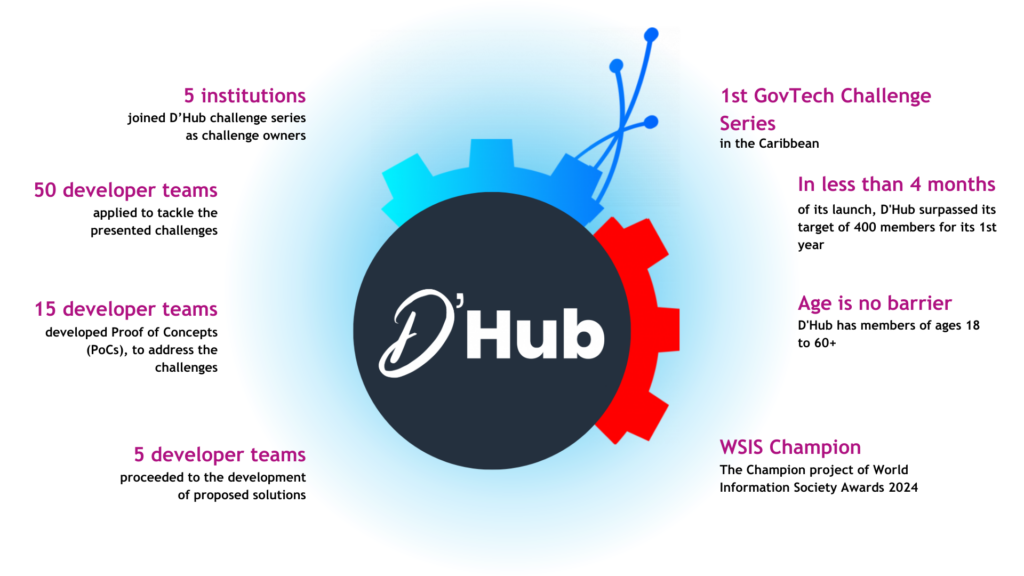Trinidad and Tobago is setting a high standard for government-led digital transformation with the launch of its National Digital Transformation Strategy (NDTS) 2024-2027. Spearheaded by the Ministry of Digital Transformation (MDT) in partnership with the Inter-American Development Bank (IDB), this strategy offers a blueprint for building a connected, inclusive, and innovative nation – one that other countries can study and adapt to their own contexts.
A Strategic National Initiative
At the NDTS Symposium, held on February 12th, Minister of Digital Transformation, Senator the Honourable Hassel Bacchus, emphasized that:
Digital transformation is a national effort, and its success depends on our collective commitment.
To ensure active citizen engagement and transparency in the practical implementation of the strategy, the government introduced two key digital tools:
- EngageTT: A platform providing real-time updates and a channel for citizen engagement.
- AskNDTS: An AI-powered Chatbot dedicated to help citizens understand the NDTS, its digital initiatives, and its impact on the citizens.
For peer government officials from other countries, these two flagship initiatives provide a great practical example how smartly applied digital instruments can foster collaboration between citizens and government, ensuring that policy implementation is both inclusive and responsive.
Global Perspectives with Local Impact

At the symposium, Ieva Žilionienė, Chief Consulting Officer at NRD Companies and keynote speaker of the Digital Economy panel, shared key insights on global trends, best practices, and practical measures that help governments foster national digital economies. She highlighted five essential focus areas:
- Investing in digital infrastructure, to ensure adequate digital infrastructure, such as sufficient broadband access, reliable internet speeds, and accessible electricity, which form the digital backbone for any digital operations, both in public and private sectors.
- Investing in digital skills and R&D, addressing gaps in digital and technological talent and skills, and ensuring that people can not only use digital tools efficiently, but also develop innovative and competitive digital products and services for their local communities.
- Creating reliable business environment, providing business confidence in areas such as digital trade, innovation, security, and intellectual property, while ensuring protection without suffocating progress.
- Fostering synergies between public and private sectors, as a digitally competitive ecosystem cannot be built just by the government – it’s crucial to hear the needs of businesses, support them, and grow country together with them.
- Enhancing International Cooperation, e.g. multilateral agreements on data privacy, cybersecurity, and digital trade can create a more stable and predictable digital environment and open access to new markets.
These focus areas and lessons are relevant not only to Trinidad and Tobago but also provide valuable lessons for other countries in the region.

In addition, drawing on global data, Ieva illustrated the scale of the digital economy:
- Global Digital Economy: Valued at approximately $16.5 trillion in 2024, digital technologies account for 17% of the world’s GDP (Forrester).
- ICT Sector Growth: The ICT sector in 27 The Organization for Economic Cooperation and Development (OECD) countries grew at an average annual rate of 6.3% between 2013 and 2023, outpacing overall economic growth (OECD). Recent growth reached 7.6% in 2023.
- E-commerce Expansion: Global business-to-consumer (B2C) e-commerce revenue is projected to reach USD $5.5 trillion by 2027, with a compound annual growth rate of 14.4% (U.S. International Trade Administration).
- Digital Leadership: Research shows that digital leaders generate 60% more revenue and innovate 25% faster than their counterparts (Equinix).
These insights reinforce the importance of adopting a data-driven approach to policymaking – one that supports continuous investment in digital infrastructure and human capital.

NRD Companies’ Role in Accelerating Transformation
NRD Companies are proud to contribute to Trinidad and Tobago’s digital transformation journey. Among several NRD projects implemented in the country, “The Developers’ Hub (D’Hub) – Technical Advisory Services” project, funded by the IDB, directly supports national efforts to foster a more robust national digital economy and innovative public sector. Country’s flagship initiative Developers Hubacts as a pilot initiative aimed at strengthening local digital talents, fostering collaboration and co-creation between public institutions and citizens with innovative ideas, and promoting innovative practices in the country while enhancing national economy.
D’Hub is a virtual platform designed to encourage the collaborative development of open-source applications tailored to public needs. Through its structured D’Hub Challenge Series, co-created together with NRD Companies, local innovators are empowered to propose and implement digital solutions to key public, social, economic, and environmental challenges identified by the public institutions.
To learn more about the full scope and impact of this initiative, please visit D’Hub case study.

Why This Matters for Governments Worldwide
Trinidad and Tobago’s National Digital Transformation Strategy (NDTS) offers a holistic, people‐centred blueprint for leveraging digital technologies to improve lives and drive sustainable national growth. Built on extensive local consultations and a deep understanding of the country’s unique cultural and socio-economic context – as detailed in the NDTS document – the strategy provides critical lessons for governments everywhere:
- Inclusivity and Citizen-Centric Design: The NDTS places people at its heart by ensuring equitable access to technology and tailored digital services that reflect the diverse needs of communities. This inclusive approach ensures that no citizen is left behind in the digital revolution.
- Strategic Investments in Infrastructure and Human Capital: Recognizing that robust digital infrastructure and continuous skill development are essential for long-term success, the strategy advocates for targeted investments in high-speed connectivity, digital literacy, and capacity building to empower citizens and stimulate economic growth.
- Collaborative Ecosystems: By promoting strong partnerships among public institutions, the private sector, and civil society, the NDTS demonstrates how co-creation and collaboration can break down bureaucratic siloes, drive innovation, and accelerate digital service delivery.
- Global and Regional Integration: The strategy emphasizes the importance of aligning with international standards and fostering multilateral cooperation. This not only enhances Trinidad and Tobago’s competitiveness in the global digital economy but also provides a model for cross-border collaboration and knowledge sharing.
Government leaders and policymakers in other countries can learn from Trinidad and Tobago’s comprehensive strategy. By adopting similar frameworks and leveraging innovative solutions such as the GovTech Innovation Accelerator, governments can foster a vibrant digital economy and create resilient, efficient, and forward-looking public services. Ultimately, these approaches help build a digital future that improves quality of life for all citizens and ensures sustainable, inclusive growth in an increasingly interconnected world.
Looking Ahead
Summarizing Ieva’s insights from this memorable event, here are some of the most important takeaways:
- Interconnectedness: No country is an island in the digital world – even small island nations like Trinidad and Tobago play a significant role in the global digital landscape.
- Holistic Transformation: Digital transformation extends far beyond the government sector – it encompasses business, civil society, and entire communities.
- Clear Vision and Direction: A comprehensive strategy provides a clear vision that mobilizes diverse stakeholders toward a shared, forward-thinking goal.
- Implementation is Key: The true value of any strategy lies in its execution. A clear, actionable roadmap is essential to translate vision into reality by defining priorities, allocating resources, and breaking down institutional silos.
- Flexibility and Adaptability: Smaller economies that embrace flexibility and adaptability are better positioned to thrive in the face of new challenges.
Trinidad and Tobago’s Digital Transformation Strategy serves as a powerful example of how a nation can harness digital technologies to drive holistic, sustainable progress. By adopting similar integrated approaches, governments and societies worldwide can build resilient, inclusive digital ecosystems that enhance the quality of life for all citizens.












